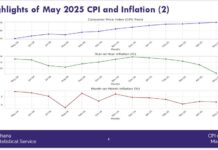Health officials in Kumasi had front row seats for the premier of Ghana’s first documentary film on eye health. The film, an innovative tool for social change, will be rolled out this month to reduce preventable and treatable blindness and visual impairment in the country by changing the way communities access eye healthcare services.
The training of film facilitators, in partnership with Ghana Health Services, has equipped healthcare officials from four districts; Afigya Kwabre, Atwima Kwanwoma, Bosomtwe and Ejisu Juaben to take the film into their communities to bring about social change and raise awareness around eye health.
The film, titled Meresa Biom (Dancing Again), was produced by international NGO Orbis with funding from Standard Chartered Bank’s Seeing is Believing (SiB) initiative. Since 2014 Orbis has worked in Ghana in collaboration with the Komfo Anokye Teaching Hospital (KATH), international NGO Himalayan Cataract Project and the Ministry of Health with the aim to strengthen child eye health at KATH, the city of Kumasi and the neighbouring Ashanti region. The investment from SiB is funding Orbis’s work at community-, primary- and district levels in the healthcare and education systems to contribute to the reduction of childhood blindness and visual impairment in the Ashanti region.
A research study by acclaimed South African anthropologist, Dr Susan Levine, was the catalyst for Orbis’s decision to harness the power of film to drive its prevention and treatment models for avoidable childhood blindness on the African continent. Levine’s study, the first of its kind in Africa, revealed a series of barriers and obstacles that are preventing children from accessing vital medical intervention which could prevent childhood blindness.
“Overcoming these barriers required innovative communication methods hence Orbis’s decision to harness the power of film,” explains Lene Øverland, Orbis International Africa Regional Director. “Facilitated Film Screenings have proven to be an effective communications tool for achieving social change.”
Orbis International Africa first partnered with STEPS (Social Transformation and Empowerment Projects), who pioneered the facilitated film screening methodology, in 2014. STEPS, a special collaboration between filmmakers from Southern Africa and European broadcasters, produced the documentary to initiate social change and pioneer awareness of eye disease. The first eye health film was produced in South Africa, followed by two films for Zambia. Meresa Biom, the fourth eye health film on the continent, is a first for Ghana.
Meresa Biom follows 9-year-old Hikmah, a passionate pupil and avid dancer living with her parents in Kumasi, Ghana. The film reflects on her experience of dealing with an injury to her eye while playing with friends, a year earlier. Through personal accounts from Hikmah, her family members and an Orbis-trained ophthalmologist, we hear how unnecessary delay impacted her vision. The film encourages seeking treatment immediately when noticing any abnormality with a child or an adult’s eyes or vision.
The STEPS facilitated screening model combines film with facilitation as a powerful tool to promote debate and discussion and bring about enlightened social change. STEPS film screenings are always contextualised with personal testimonies and are followed by a discussion where facilitators encourage the audience to decide on individual and group action as a way forward. Actions can include challenging stigma and discrimination, the decision to seek services or to advocate for access to high quality equitable eye health services.
“With the number of blind children in Ghana estimated to be more than 9,000 and with 50% to 70% of these cases being avoidable, there is a need for effective public-private partnerships. Since 2010, Orbis International Africa has worked to pilot the most appropriate model for comprehensive child eye health in Africa and works closely with Ministries of Health and other key partners on this model,” says Øverland.
Ghana has achieved laudable results with regards to the Millennium Development Goals. especially in the areas of poverty, safe drinking water and education. However, health objectives, particularly maternal health and communicable disease have lagged.
Commenting on the documentary Mrs. Mansa Nettey, Chief Executive of Standard Chartered Bank Ghana Limited said, “Standard Chartered Bank, through its Seeing is Believing initiative, is excited to be collaborating with Orbis to provide a holistic approach to health systems strengthening. Our investment in eye health in Ghana will see various sectors collaborating to improve the quality and effectiveness of eye care services particularly for children and the promotion of positive health seeking behaviour within low income communities in Ghana.”










